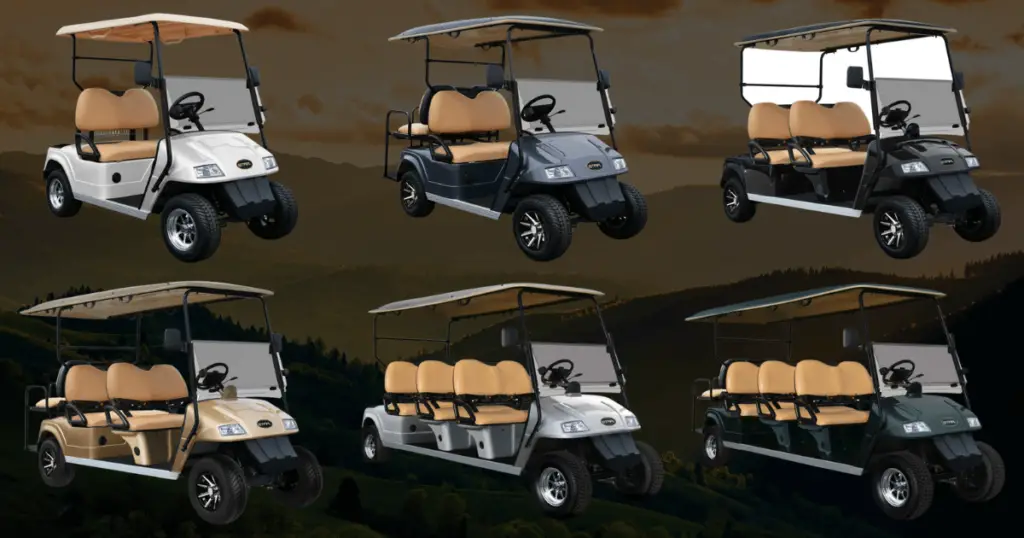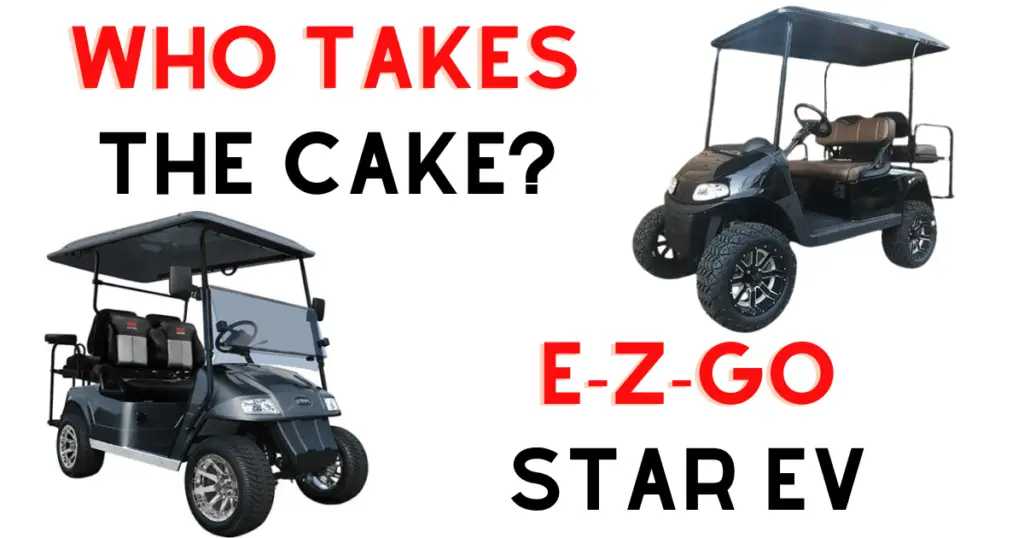The debate between Star EV and EZ GO is a prominent one in the realm of golf cart aficionados. As the demand for more efficient, versatile, and eco-friendly off-road vehicles rises, these two brands stand out in the electric golf cart industry. This comparison aims to navigate the intricate details that set apart these titans of the turf. Whether you’re cruising the neighborhood or looking for the perfect EV golf cart to carry you through the course, the differences between Star EV and EZ GO are as nuanced as they are significant.
Alongside performance metrics and practicality levels, the perception and realities of ownership play pivotal roles in steering potential buyers in one direction or the other. If you are considering an electric golf cart and find yourself weighing Star EV vs EZ GO golf carts, this comprehensive golf cart comparison will provide you with the crucial information needed to make an informed decision. From the fairway to your driveway, let’s delve into what these electric vehicles have to offer.
Key Takeaways
- Star EV offers cost-effective electric carts with features geared towards electric efficiency and range.
- EZ GO stands as a stalwart in golf cart performance with a longstanding reputation for reliability.
- Understanding the services and parts availability can significantly sway user preference.
- Ownership costs, such as maintenance and battery life, are critical in the long-term assessment of both Star EV and EZ GO carts.
- Comfort, customization, and user experience are of paramount importance in the EV golf cart domain.
- Considering an electric golf cart’s speed and agility is essential for performance on and off the greens.
- Resale value and brand recognition can influence the decision between Star EV and EZ GO.
If you’d like, you can dive deeper into some other comparisons first:
– Advanced EV vs EZGO: An In-Depth Golf Cart Comparison
– EZGO TXT vs RXV: Young Buck or Old Guard? (A Comparison)
– Evolution Golf Carts vs EZGO: Comparable At All? Yes and No
– Icon vs EZGO Golf Carts: Are They Even Comparable?
– Star EV vs Club Car: An In-Depth Golf Cart Comparison
– Star EV vs Icon: A Comprehensive Showdown and Comparison
Understanding the Star EV and EZ GO Golf Cart Offerings
The electric vehicle market has seen substantial growth, with Star EV and EZ GO golf carts leading the pack in the realm of electric golf transportation. These brands highlight the integration of utilitarian features within their diverse models, providing consumers with a range of options to suit their specific needs.

Star EV, renowned for its cost-effective approach, aligns with the practical side of electric vehicles. The carts are known for features that go beyond the typical expectations of a golf cart, such as fold-down rear seats which offer a level of versatility rarely found in similar EVs. Moreover, the assembly of these carts in South Carolina introduces a domestic touch to the brand, which is often associated with Chinese manufacturing. Highlighting the practicality of the vehicle, options like locking glove boxes and automatic water fill systems are often cited as reasons for the growing popularity of Star EV.

In contrast, EZ GO carries with it the legacy of American manufacturing and has cemented a powerful presence in the golf cart industry. These carts are exalted for their durability and the excellent service provided through their extensive dealership network. With a focus on long-term reliability, EZ GO has developed a line-up of golf carts that successfully balance performance with ease of maintenance.
- Star EV caters to a diverse audience, emphasizing availability in various models to meet distinct consumer preferences.
- EZ GO continues to uphold its tradition of producing high-quality electric golf carts favored by both recreational and professional users.
The choices between these two prominent electric vehicles become clearer when taking into account the various utilitarian features and the breadth of diverse models available. Whether the choice is made for a Star EV for its functional versatility or an EZ GO for its unwavering dependability, both offer remarkable experiences in the realm of electric golf carts.
Performance and Speed: Evaluating Star EV vs EZ GO

When embarking on an electric golf cart speed comparison, it’s essential to consider not only the technical specifications but also how these figures translate into real-world use. Star EV and EZ GO, both prominent names in the industry, go head-to-head with their offerings, each bringing unique attributes to the course.
Top Speed and Power Comparisons
For those evaluating performance, a power comparison between Star EV golf cart models and EZ GO’s lineup is indispensable. With electric golf carts becoming ever more sophisticated, the speed capabilities of these carts have risen. Certain Star EV models boast an impressive top speed of 28 mph, setting them apart in terms of outright pace. Meanwhile, EZ GO carts are renowned not only for their speeds but also for efficiently navigating the undulations of the green, fostering a balance between performance and golf cart efficiency.
User Experiences with Star EV’s Speed and Agility
Agility is another critical aspect, particularly when it comes to the diverse turns and varied terrain encountered during a game of golf. Owners express that the agility of Star EV carts, such as the highly regarded SST model, allows for nimble movement and swift changes in direction. However, user experiences are varied, with some critique regarding the practicality of certain designs, like the narrow golf bag attachments, which may not meet the needs of all users.
Examining EZ GO’s Performance on the Greens
A seasoned golfer’s testimonial notes, “The EZ GO cart is a staple on the course for its consistency and reliability. It’s one thing to navigate the greens, but EZ GO masters it, making it an exemplary tool for the sport.”
This sentiment captures the greens navigation prowess of EZ GO carts. Moreover, the enduring performance of EZ GO golf carts has become a benchmark over the years, supporting their longstanding reputation within the golfing community.
Star EV vs EZ GO: Features, Customization, and Comfort
When it comes to making a purchase decision for a golf cart, discerning consumers weigh the availability of customization options and the level of comfort provided. Star EV is dedicated to delivering a tailored experience, allowing owners to integrate various comfort features that enhance the driving and riding experience. For instance, Star EV has gained recognition for their backward-facing seats, a versatile element that folds to accommodate golf club storage – a clever nod to their adaptability.
On the other hand, EZ GO excels in the realm of golf cart customization. They provide an expansive suite of personalized touches that go beyond the conventional, giving customers the freedom to create a cart that precisely reflects their style and functional needs. With EZ GO, the journey to crafting a personalized golf cart is both engaging and extensive, ranging from aesthetic tweaks to pragmatic enhancements.
- Versatility: Both brands offer a variety of features designed to meet the unique needs of different users, whether it’s for leisurely rounds on the course or for off-road adventures.
- Comfort Features: Luxury seating options, climate controls, and smooth suspension systems are just a few examples of how these carts deliver on comfort.
- Golf Cart Customization: A high level of customization is common, with options including paint colors, wheel designs, and even entertainment systems.
To conclude, the battle between Star EV and EZ GO in the golf cart market is closely tied to these vehicles’ versatility, as well as the range of comfort features and customization options they offer. Considering these attributes is critical for those looking to invest in a golf cart that not only serves its purpose but also provides a sense of individuality and pleasure.
Maintenance, Durability, and Long-Term Ownership

For golf cart enthusiasts, understanding the intricacies of golf cart maintenance and the nuances of long-term ownership can mean the difference between a wise investment and a costly error. Insightful user feedback has highlighted the divide in owner experiences between Star EV and EZ GO, guiding potential buyers toward a sound decision that balances costs of ownership with expected performance.
Dealing with Maintenance: User Feedback on Star EV and EZ GO
Maintenance concerns play a pivotal role in owning a golf cart. Star EV owners have voiced challenges in securing parts and service, while others have managed with basic upkeep and occasional battery attention. In contrast, EZ GO stands out for its golf cart reliability and the ease with which their service network facilitates maintenance requests.
Costs of Ownership: Battery Life and Replacement
A significant aspect of ownership cost pertains to battery life and the inevitable battery replacement. Typically, a span of three to four years signifies the threshold for a new battery investment, circling around $1,000. Yet, there’s a trend among Star EV patrons who are transitioning to lithium battery options, seeking to reduce the frequency of this cost despite a heftier initial outlay.
Reliability and Resale Value: What Owners Are Saying
“My EZ GO has stood the test of time, and its durability speaks volumes about its resale value. It seems to run as smoothly on day one thousand as it did on day one,” notes a seasoned golf cart owner.
Conversely, Star EV, while appreciated for its longevity and potential for upgrades, may not have the same heft in the resale value department, attributed to its lesser visibility in the secondary market. Ultimately, owner experiences vary, but the consensus underscores the importance of reliability in both usage and investment return.
However, each brand has recurring problems you should be aware of:
– Star EV Golf Cart Problems: Too Much To Handle? (+Expert Input)
– EZGO RXV Problems: Definitive Overview (+Fixes)
Golf Cart Upgrades Worth Your While:
- The Best Golf Cart Heater Gets Revealed (for Warm Balls)
- The Best Golf Cart Fan On The Market (+Alternatives)
- The Best Golf Cart Soundbar in (Gets Revealed)
Conclusion
In wrapping up the electric golf cart debate between Star EV and EZ GO, it has become evident that both brands carve out unique spaces in the electric golf cart industry. On one hand, the Star EV presents a compelling case for those seeking economically priced options with features not commonly found in similar price brackets. However, the shadow of availability issues regarding parts and service looms overhead, potentially complicating ownership for those without easy access to maintenance resources.
EZ GO, on the other side of the green, upholds its long-standing renown for dependability and backs it with a supportive network for servicing. Their strong foundation in the golf cart market reassures users of a tried and tested vehicle that stands the test of time. This level of ongoing support and trust has cemented EZ GO’s status as a recommended choice for many within the golf community, particularly for those valuing consistent performance over adventurous features.
When facing the final thoughts on the matchup of Star EV vz EZ GO, it is not a matter of which brand eclipses the other, but instead, which aligns more resolutely with the personal requirements and expectations of the golfer in question. Factors such as the importance of aftersales service, budget constraints, and preference for innovative features over traditional performance must all be weighed. In essence, the deciding stroke in this game lies within the individual’s assessment of what factors steer their course on the fairway of electric golf cart ownership.
FAQ
What distinguishes Star EV golf carts from EZ GO in terms of electric efficiency?
Star EV golf carts are known for their electric efficiency, often featuring eight 6-volt batteries that provide a notable range, making them a strong option for those prioritizing energy usage and extended range. EZ GO carts, while also efficient, have a long-standing reputation for reliable performance that has kept them at the forefront of the golf cart market.
How do the speeds of Star EV and EZ GO golf carts compare?
Both Star EV and EZ GO offer competitive speed options in their golf carts. Star EV models can reach up to 28 mph, depending on the model, while EZ GO carts are known for their solid performance, particularly on the golf course, balancing speed with meticulous control for navigating the greens.
What are the customization options like for Star EV and EZ GO golf carts?
Star EV provides customization features such as fold-down rear seats for versatility and automatic fill systems. EZ GO offers a wide range of personalization options, making it possible for owners to build a golf cart tailored to their specific needs and preferences. Both brands cater to users looking to customize their golf carts for comfort and practicality.
Can you elaborate on the assembly and manufacturing of Star EV carts?
Star EV carts are associated with being cost-effective options and feature functional utilitarian features. While they are linked to Chinese manufacturing, they are assembled in South Carolina and offer specific amenities such as locking glove boxes, providing a mix of international design with local assembly.
How reliable are EZ GO golf carts compared to Star EV?
EZ GO has traditionally been known for its American manufacturing, developing a reputable name in the golf cart industry for reliability. They’ve been regarded for excellent service and maintenance, which often translates into a stronger resale value compared to Star EV, which is sometimes perceived as a less-established brand in the secondary market.
What are the maintenance and long-term ownership experiences like for Star EV versus EZ GO golf carts?
Opinions on maintenance for Star EV and EZ GO golf carts vary among owners. Some Star EV owners have faced challenges in obtaining service and parts, while EZ GO golf carts are generally praised for their accessible service network and reliable maintenance. Both brands require battery replacements every few years, with the costs averaging around
In: